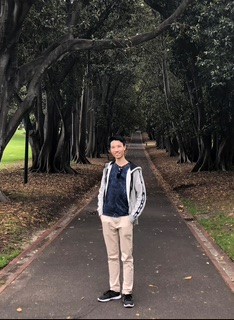SciSoc Spotlight Issue 15 – Dr Jingwei Zeng
18 January 2021. Dr Jingwei Zeng is with the Medical Research Council (MRC) Laboratory of Molecular Biology (LMB). A PDF version of this Issue is available here.Research focus: Intracellular antibody receptor TRIM21 role and function
My PhD topic focused on studying the role of the intracellular antibody receptor TRIM21 in antiviral immunity and the molecular mechanisms of TRIM21 functions. Antibodies are classically described as molecules of the humoral immune response that are capable of activating extracellular effector functions to prevent infection. However, work in the James lab over the past decade have shown that antibodies are carried into cells during infection by viruses and intracellular bacteria. This ground-breaking discovery has revolutionised our understanding of antibody immunity and has important implications for future vaccine and gene therapy design.In addition to antiviral immunity, the natural function of TRIM21 as a cytosolic antibody receptor has been exploited to enable the utilisation of off-the-shelf antibodies to achieve fast degradation of cellular proteins in a technique known as “Trim-away”. This technique has enabled functional studies of proteins that were previously intractable to genetic-based techniques such as RNAi and CRISPR.
My first project was to study the importance of the TRIM21 system in human immunity to viral infection by investigating the impact of naturally occurring missense mutations on TRIM21 function. The outcome of this study showed that human TRIM21 is a highly conserved compared to other immune genes and that the vast majority of coding mutations did not have a detrimental effect1. This finding provided evidence that TRIM21 mediated antiviral immunity is important and conserved in the human population.
My second project focused on the molecular mechanisms by which TRIM21 is regulated and activated upon detection of virus-antibody complex and how the subsequent catalysis occurs2 to activate downstream intracellular immune signalling and effector functions.

What made you decide to pursue research?
I have long had an interest in viruses and how they interacted with their host. It seems bizarre to me how something that is as simple as a virus particle, on the border of life, can wreak havoc in complex multicellular organisms such as ourselves. For example, HIV which persists in its human host using a mere nine genes and fifteen viral proteins but causes catastrophic immune failure if left unchecked. The Cambridge pre-clinical medicine course has equipped me with the necessary theoretical knowledge, and a successful Part II project experience made me decide that I wanted to pursue further research. I really enjoyed the process of formulating research questions, designing and performing the necessary experiments and getting first-hand results.I did a PhD as part of the Cambridge MB/PhD programme, which enabled me to integrate doctoral research into my medical training. For my PhD, I joined Leo James’ group at the Medical Research Council Laboratory of Molecular Biology (LMB). My reasons for working at the LMB were mainly three-fold. Firstly, Leo had an interesting project that was practical and realistic for a PhD student with a fixed deadline. Secondly, the James lab was very friendly and had a good dynamic when I visited to discuss potential PhD projects. Thirdly, the building only opened in May 2013, which meant nice modern offices and facilities. The other benefits of working in the LMB are the availability of lab support services, access to specialist equipment and core funding which were incredibly helpful and allowed me to work efficiently and focus on my experiment at hand.

What would be your advice to aspiring researchers?
My advice would be to make sure that research is something that you truly enjoy doing before embarking on a lengthy PhD study. Get involved in shorter-term research such as summer project, Part II project or even a master’s project to help you with your decisions. You should also think about the subject area that interests you and try to get some experience in the relevant field if possible. Don’t be afraid to step outside your comfort zone and try something different but bear in mind any time limitations and what you can realistically achieve. You should plan ahead and research available funding options. Lastly, who you work with is just as important as what you do, so make sure that you do some background research and arrange to meet your potential supervisors if at all possible.Selected Publications
- Zeng, J., Slodkowicz, G. & James, L. C. Rare missense variants in the human cytosolic antibody receptor preserve antiviral function. Elife 8, (2019).
- Kiss, L. et al. A tri-ionic anchor mechanism drives Ube2N-specific recruitment and K63-chain ubiquitination in TRIM ligases. Nat Commun 10, 4502 (2019).
Trackback from your site.

